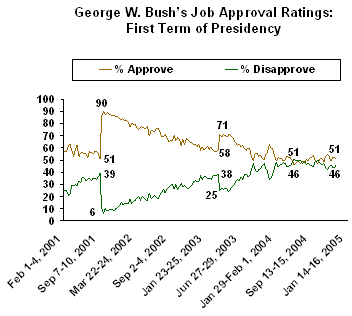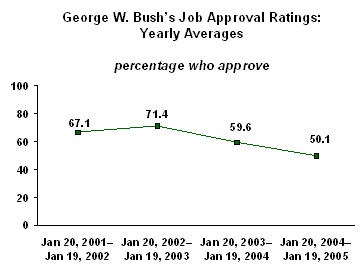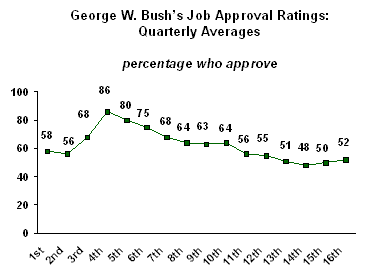GALLUP NEWS SERVICE
PRINCETON, NJ -- Today marks the last day of George W. Bush's first term as president. He ends the term with one of the best average job approval ratings of any recent president, due in large part to several rally events in his first term. Bush's 50.1% average for his fourth year in office is the lowest of his presidency to date, and his current rating of 51% ties for the lowest that any recent president has had at the outset of his second term. Terrorism has been a major issue during Bush's presidency, and that is the issue on which he has been rated most highly. Looking back on his first term in office, most Americans believe he did not accomplish a lot of goals that a president could, but most do give him credit for improving the country's military security.
Bush Job Approval Trend
It is hard to describe the first term for Bush without talking about "rally events." These are incidents, usually involving international matters, that trigger a sudden increase in public support for government officials, particularly the president. The Sept. 11, 2001, terror attacks produced the largest rally in presidential job approval that Gallup has measured. Bush's immediate pre-9/11 approval rating of 51% increased to 86% following the attacks, eventually reaching 90% -- the highest presidential job score Gallup has measured.
Bush's approval ratings gradually declined after that, remaining above 80% until March 2002, above 70% until July 2002, and above 60% until January 2003.

In March 2003, Bush experienced another approval rally, following the onset of U.S. military action in Iraq. His 58% mid-March job approval rating increased to 71% a week later.
The rally after the beginning of the Iraq war did not have the staying power of the post-Sept. 11 rally, though, and the former's effects had fully dissipated by July 2003. Bush's approval rating dropped to a low of 50% in September 2003, shortly after his nationally televised address in which he reported on the difficulty of the situation in Iraq, and asked Congress to support an additional $87 billion in funding for the U.S. efforts there and in Afghanistan.
On Dec. 13, 2003, the U.S. military captured former Iraqi dictator Saddam Hussein, who had fled Baghdad at the start of the military action. That caused another bump in support for Bush, to 63%. However, by the end of January, when the Democratic presidential nomination contests dominated the news, Bush's approval hit a new low of 49%.
Bush's approval rating more or less hugged the 50% line during the political season last year, ranging from a low of 46% in May, following reports of Iraqi prisoner abuse, to 54% in September, just prior to the presidential debates. Bush had a 48% job approval rating as he was re-elected, and got a slight "victory bounce" to 53% (and subsequently to 55%) after he defeated John Kerry.
Bush Approval Averages
Overall, Bush averaged a 62.1% job approval rating during his first term -- the fourth best among recent presidents, and the second best for a full term behind Eisenhower's 69.6% for 1953 to 1957.
|
President |
Term (dates) |
Term average |
|
Lyndon Johnson |
First (1963-1965)^ |
74.2 |
|
John Kennedy |
First (1961-1963)^ |
70.1 |
|
Dwight Eisenhower |
First (1953-1957) |
69.6 |
|
George W. Bush |
First (2001-2005) |
62.1 |
|
George H.W. Bush |
First (1989-1993) |
60.9 |
|
Bill Clinton |
Second (1997-2001) |
60.7 |
|
Dwight Eisenhower |
Second (1957-1961) |
60.5 |
|
Harry Truman |
First (1945-1949)^ |
56.9 |
|
Richard Nixon |
First (1969-1973) |
55.8 |
|
Ronald Reagan |
Second (1985-1989) |
55.3 |
|
Lyndon Johnson |
Second (1965-1969) |
50.3 |
|
Ronald Reagan |
First (1981-1985) |
50.3 |
|
Bill Clinton |
First (1993-1997) |
49.5 |
|
Gerald Ford |
First (1974-1977)^ |
47.2 |
|
Jimmy Carter |
First (1977-1981) |
45.5 |
|
Harry Truman |
Second (1949-1953) |
35.4 |
|
Richard Nixon |
Second (1973-1974)^ |
34.4 |
|
|
||
However, as the above review makes clear, Bush's recent numbers have been mediocre. His most recent yearly average was 50.1%, easily the worst of his presidency. While nowhere near the lofty status of his earlier yearly averages, it should be noted that presidents' job approval ratings in re-election years have rarely exceeded 60%.

Among the 62 presidential "years" for which Gallup has data, Bush's 50.1% average for 2004-2005 ranks only 39th. His first-year average of 67.1% rates as the 11th best yearly average, his second-year average of 71.4% is the 8th best, and his third-year score of 59.6% is the 27th best.
A look at Bush's quarterly averages shows some slight upward movement in his recent support, probably due to the November "victory bounce." For the 16th quarter of the Bush presidency (from Oct. 20, 2004 to Jan. 19, 2005), an average of 52% of Americans approved of the job he was doing. That is slightly better than averages of 50% in the 15th quarter and 48% in the 14th quarter.

Bush starts his second term with a 51% job approval rating. That is low compared with other presidents at the beginning of their second terms. Harry Truman, Ronald Reagan, and Bill Clinton had approval ratings in excess of 60%, and Dwight Eisenhower and Lyndon Johnson were above 70%. Only Richard Nixon had a comparably low approval rating heading into his second term, and this quickly increased following the end of U.S. military action in Vietnam.
|
Approval Rating for Presidents Just Prior to Beginning Their Second Terms |
||
|
President |
Pre-inauguration |
Dates of |
|
Truman |
69% |
Jan 7-12, 1949 |
|
Eisenhower |
79% |
Dec 14-19, 1956 |
|
Johnson |
71% |
Jan 7-12, 1965 |
|
Nixon |
51% |
Jan 12-15, 1973 |
|
Reagan |
62% |
Jan 11-14, 1985 |
|
Clinton |
62% |
Jan 10-13, 1997 |
|
Bush |
51% |
Jan 14-16, 2005 |
Bush Approval on the Issues
Bush's response to the Sept. 11 terrorist attacks won him high marks from the public. Throughout his first term, he was rated quite positively for his handling of terrorism. An average of 65% approved of Bush's handling of terrorism during his first term, and a healthy 58% still do as he begins his second term.
Bush also averaged above 50% job approval on foreign affairs, education, taxes, Iraq, and the economy in his first term, though education is the only issue other than terrorism on which his latest rating tops 50%. Bush's weaker points were healthcare and the federal budget. In fact, in the Jan. 7-9 CNN/USA Today/Gallup poll, only 32% approve of Bush's handling of the federal budget deficit.
|
Issue |
Average |
Number of measurements |
Most recent |
Date of most recent |
|
Terrorism |
65% |
20 |
58% |
2005 Jan 7-9 |
|
Foreign affairs |
58% |
46 |
47% |
2005 Jan 7-9 |
|
Education |
58% |
8 |
52% |
2005 Jan 7-9 |
|
Taxes |
55% |
10 |
49% |
2005 Jan 7-9 |
|
Situation in Iraq |
53% |
29 |
42% |
2005 Jan 7-9 |
|
Economy |
51% |
52 |
50% |
2005 Jan 7-9 |
|
The environment |
49% |
5 |
49% |
2005 Jan 7-9 |
|
Social Security |
47% |
4 |
41% |
2005 Jan 7-9 |
|
Energy |
46% |
7 |
33% |
2004 Jun 3-6 |
|
Healthcare policy |
43% |
9 |
40% |
2005 Jan 7-9 |
|
Federal budget (deficit) |
42% |
7 |
32% |
2005 Jan 7-9 |
Bush Accomplishments
A new CNN/USA Today/Gallup poll, conducted Jan. 14-16, asked Americans for a more in-depth assessment of Bush's first term -- whether or not he accomplished each of 12 different objectives a president may have.
Next I have some questions about the Bush administration. Whether or not you support Bush, in your view, do you think the Bush administration did or did not do each of the following in its first term in office? How about -- [random order]?
|
2005 Jan 14-16 |
|
|
|
% |
% |
|
|
Improved military security for the country |
62 |
36 |
|
Improved moral values in the United States |
50 |
49 |
|
Cut your taxes |
46 |
48 |
|
Kept America prosperous |
46 |
50 |
|
Increased respect for the presidency |
45 |
52 |
|
Improved education |
42 |
52 |
|
Improved respect for the United States abroad |
32 |
65 |
|
Improved the quality of the environment |
31 |
63 |
|
Ensured the long-term strength of the Medicare system |
28 |
63 |
|
Healed political divisions in this country |
27 |
68 |
|
Improved the healthcare system |
26 |
69 |
|
Ensured the long-term strength of the Social Security system |
18 |
74 |
Apparently, Americans would say Bush has much to do in his second term. Improving military security for the country is the only one of 12 objectives that most Americans credit Bush with achieving in his first term. Half of Americans also say he improved moral values in the country. Less than half of the public says Bush achieved any of the other goals in his first term, with fewer than one in three Americans saying Bush "improved respect for the United States abroad," "improved the quality of the environment," "ensured the long-term strength of the Medicare system," "healed political divisions in this country," "improved the healthcare system," and "ensured the long-term strength of the Social Security system."
Survey Methods
These results are based on telephone interviews with randomly selected national samples of approximately 1,000 adults each, aged 18 and older, conducted February 2001 to January 2005. For results based on these samples, one can say with 95% confidence that the maximum error attributable to sampling and other random effects is ±3 percentage points. In addition to sampling error, question wording and practical difficulties in conducting surveys can introduce error or bias into the findings of public opinion polls.
